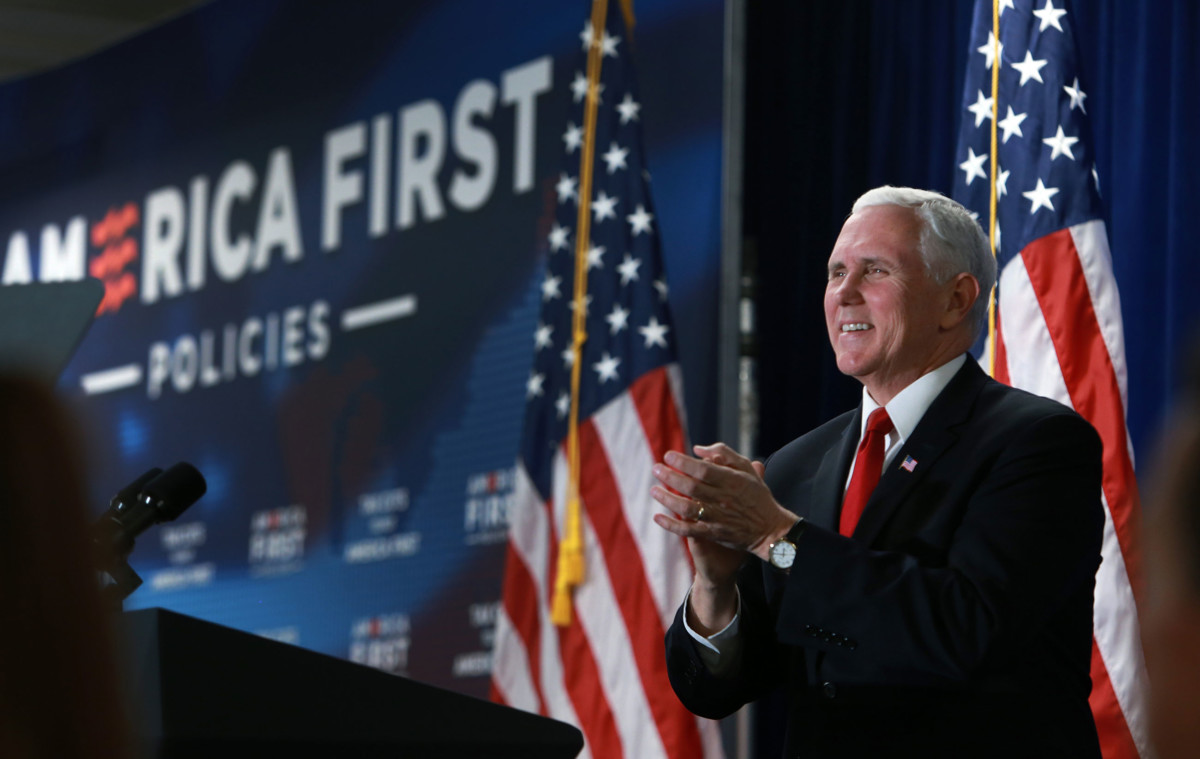Honest, paywall-free news is rare. Please support our boldly independent journalism with a donation of any size.
Brett Kavanaugh stars in one heavily-promoted digital ad calling on senators to confirm President Trump’s Supreme Court nominee. We don’t know who donated the $791,160 for nonprofit America First Policies’ Kavanaugh ad campaign, nor the $30 million the group reportedly collected last year. But it’s a safe bet that the White House knows.
America First Policies, having registered with the government as a 501(c)(4) social welfare nonprofit, does not disclose its donors even as it maintains a revolving door between it, the Trump campaign, and the White House. The group has spent millions of dollars on campaign-style ads touting President Trump and his policies on taxes, healthcare, and more. Its proximity to the nation’s most powerful elected office makes AFP the most urgent example of a growing practice and problem: elected officials who use nonprofits to raise unlimited advertising funds from secret donors.
The president’s top political advisers created AFP in January 2017 and have led its fundraising and strategy ever since. Its founders included the Trump campaign’s digital director, Brad Parscale, manager Rick Gates, and campaign advisers to Vice President Mike Pence. Other former Trump campaign aides have held leadership positions, including Curtis Ellis as senior policy adviser and Carl Higbie as director of advocacy. In March 2017, following the first failed attempt to reform healthcare, the White House dispatched senior staffer Katie Walsh to make AFP more effective. Corey Lewandowski, who kickstarted the Trump 2016 campaign as its first manager, raised money for AFP until this past May.
To raise unlimited funds while shielding its donors, the group is supposed to avoid coordinating with candidates and not focus primarily on politics. That bar serves to stop donors from giving lavishly to what are essentially shadow campaigns and circumventing direct contribution limits that prevent corruption of candidates. Yet earlier this year, CNBC reported extensive cooperative efforts between AFP and three top pollsters for the 2016 Trump campaign. And early last year, President Trump named Brad Parscale, who serves as an adviser to AFP, manager of his 2020 campaign. Watchdog group Common Cause filed a complaint with the Federal Election Commission, demanding an investigation into illegal coordination. But the federal agency faces seemingly insurmountable partisan gridlock on controversial issues.
Staffed by some of the president’s closest aides, AFP has been able to raise and spend millions for political ads from anonymous donors:
| Date | Amount Spent* | Subject | President Trump Appearance |
|---|---|---|---|
| Aug. 2018 | $1,200,000 |
Promoting Judge Kavanaugh for a Supreme Court seat (targeting Democratic senators in states with strong support for President Trump).
|
Footage of official announcement of Judge Kavanaugh as SCOTUS nominee. |
| May 2018 | $1,500,000 |
Ad: “Support Haspel”
Advocating Gina Haspel’s confirmation as CIA director (targeting Democratic senators in red states). |
Footage of speech at Conservative Political Action Conference. |
| Nov. 2017 | $1,500,000 |
Ads: “An America First Tax Plan” and “Once in a Generation”
Promoting the GOP tax plan.
|
Footage of working in Oval Office, holding political rallies, and giving a speech. |
| June-Sept. 2017 | $1,827,395 |
Ad: “Clear”
Supporting candidates Luther Strange for Senate and Karen Handel for House of Representatives.
|
Footage of speech and rally. |
| June 2017 | $400,000 | Ad: “Safe Again”
Promoting President Trump’s anti-terrorism stance. |
Images from President Trump’s first foreign trip (Israel, Saudi Arabia, the Vatican, Belgium, and Sicily). |
| April 2017 | $3,000,000 | Ad: “Gary Palmer – Opposing Obamacare”
Pushing House Republicans to repeal Affordable Care Act. |
Footage of speech. |
| Total Amount Spent | $9,427,395 | ||
| Total Amount Raised | $30 million** | ||
| Donors: | Still unknown |
*Sources: Politico, America First Policies press releases, Politico Playbook, Washington Post,Bloomberg, Wall Street Journal, Federal Election Commission, Axios, political ads posted on the America First Policies YouTube channel.
**Source: Axios.
To be sure, President Trump isn’t the first president whose advisers helped promote his policy agenda via a lightly regulated nonprofit. In his second term, President Obama enjoyed the powerful support of Organizing for Action, a group created by his top campaign aides. Responding to critics, however, OFA elected to publicly disclose its donors even if it had no legal duty to do so. So far, AFP has not done the same.
We reported this year about the risks of corruption that arise when elected officials are able to raise unlimited advertising dollars through secretive nonprofits, especially from donors with business interests those officials can affect. In the absence of strong transparency laws, officials at other levels of government have exploited the nonprofit strategy. But America First Policies is the most prominent example of how close to power secret donors can get and why we need concrete reforms that bring accountability to these dark money groups.
Press freedom is under attack
As Trump cracks down on political speech, independent media is increasingly necessary.
Truthout produces reporting you won’t see in the mainstream: journalism from the frontlines of global conflict, interviews with grassroots movement leaders, high-quality legal analysis and more.
Our work is possible thanks to reader support. Help Truthout catalyze change and social justice — make a tax-deductible monthly or one-time donation today.
